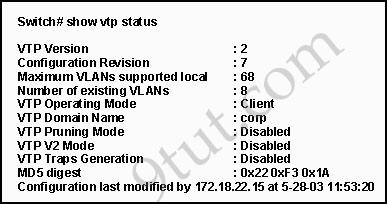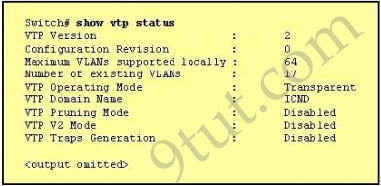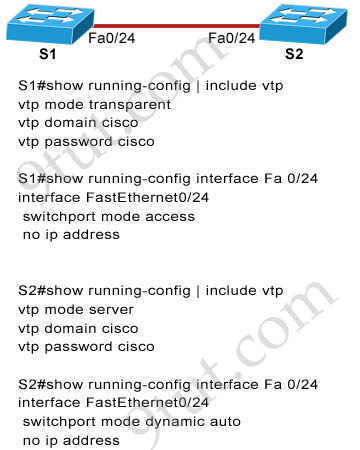CCNA – VTP Questions
Here you will find answers to VTP Questions
If you are not sure about VTP, please read my VTP tutorial
Question 1
Refer to the exhibit. After SwitchB was added to the network, VLAN connectivity problems started to occur. What caused this problem?

A. Both switches are in server mode in the same domain.
B. The revision number of SwitchB was higher than the revision number of SwitchA.
C. SwitchA was not rebooted prior to adding SwitchB to the network.
D. V2-mode is not enabled.
E. VTP pruning is not activated, so the new paths in the network have not been recalculated.
Answer: B
Explanation
SwitchB has the same VTP Domain Name with SwitchA and it has a higher Configuration Revision number (7 > 1) so it will overwrite VLAN information of SwitchA. Because SwitchB is a new switch so its VLAN information is different from SwitchA -> VLAN connectivity problem occurs.
Question 2
A network administrator is explaining VTP configuration to a new technician. What should the network administrator tell the new technician about VTP configuration? (Choose three)
A. A switch in the VTP client mode cannot update its local VLAN database.
B. A trunk link must be configured between the switches to forward VTP updates.
C. A switch in the VTP server mode can update a switch in the VTP transparent mode.
D. A switch in the VTP transparent mode will forward updates that it receives to other switches.
E. A switch in the VTP server mode only updates switches in the VTP client mode that have a higher VTP revision number.
F. A switch in the VTP server mode will update switches in the VTP client mode regardless of the configured VTP domain membership.
Answer: A B D
Question 3
What are two benefits of using VTP in a switching environment? (Choose two)
A.It allows switches to read frame tags.
B. It allows ports to be assigned to VLANs automatically.
C. It maintains VLAN consistency across a switched network.
D. It allows frames from multiple VLANs to use a single interface.
E. It allows VLAN information to be automatically propagated throughout the switching environment.
Answer: C E
Question 4
What is the name of the VTP mode of operation that enables a switch to forward only VTP advertisements while still permitting the editing of local VLAN information?
A. server
B. client
C. tunnel
D.transparent
Answer: D
Question 5
Which VTP mode is capable of creating only local VLANs and does not synchronize with other switches in the VTP domain?
A. client
B. dynamic
C. server
D. static
E. transparent
Answer: E
Question 6
An administrator is unsuccessful in adding VLAN 50 to a switch. While troubleshooting the problem, the administrator views the output of the show vtp status command, which is displayed in the graphic. What commands must be issued on this switch to add VLAN 50 to the database? (Choose two)

A. Switch(config-if)# switchport access vlan 50
B. Switch(config)#vtp mode server
C. Switch(config)# config-revision 20
D. Switch(config)#vlan 50 name Tech
E. Switch(vlan)# vlan 50
F. Switch(vlan)# switchport trunk vlan 50
Answer: B E
Explanation
First we notice that the “VTP Operating Mode” of this switch is “Client”. In this mode we can’t add new VLAN so we must change to “Server” mode -> B is correct.
Now we can add a new VLAN, E is the correct configuration for adding a new VLAN.
Question 7
To configure the VLAN trunking protocol to communicate VLAN information between two switches, what two requirements must be met? (Choose two)
A. Each end of the trunk line must be set to IEEE 802.1E encapsulation.
B. The VTP management domain name of both switches must be set the same.
C. All ports on both the switches must be set as access ports.
D. One of the two switches must be configured as a VTP server.
E. A rollover cable is required to connect the two switches together.
F. A router must be used to forward VTP traffic between VLANs.
Answer: B D
Explanation
In Cisco switches there are two encapsulations: 802.1q and ISL so we can set two ends to ISL instead -> A is not correct.
The ports between two switches must be set to trunk ports so that they can exchange VLAN information through VTP -> C is not correct.
To connect two switches we can use cross-over cable or straight-through cable (because modern Cisco switches can “auto-sense”) but not rollover cable -> E is not correct.
To forward traffic in the same VLAN (between two or more switches) we can use switches only. If we want to forward VTP traffic between different VLANs we can use either a router or a Layer 3 switch -> F is not correct.
Two switches can only communicate when they are set to the same VTP domain name (and the same VTP password) -> B is correct.
One of the two switches must be set to VTP Server so that it can create VTP updates and advertise its VLAN information.
Question 8
Which statements describe two of the benefits of VLAN Trunking Protocol? (Choose two)
A. VTP allows routing between VLANs.
B. VTP allows a single switch port to carry information to more than one VLAN.
C. VTP allows physically redundant links while preventing switching loops.
D. VTP simplifies switch administration by allowing switches to automatically share VLAN configuration information.
E. VTP helps to limit configuration errors by keeping VLAN naming consistent across the VTP domain.
F. VTP enhances security by preventing unauthorized hosts from connecting to the VTP domain.
Answer: D E
Explanation
The main purposes of VTP are to simplify switch administration and limit VLAN configuration errors by allowing switches to automatically share VLAN configuration information. It doesn’t require the administrator to go to every switch to configure VLANs.
Maybe you will feel F is also a correct answer but it is not true because VTP only enhances security by preventing unauthorized switches (not hosts) from connecting to the VTP domain (by configuring a VTP domain name & VTP password). An unauthorized host can easily use the network cable of an authorized host to access the network.
Question 9
What are two results of entering the Switch(config)#vtp mode client command on a Catalyst switch? (Choose two)
A. The switch will ignore VTP summary advertisements.
B. The switch will forward VTP summary advertisements.
C. The switch will process VTP summary advertisements.
D. The switch will originate VTP summary advertisements.
E. The switch will create, modify and delete VLANs for the entire VTP domain.
Answer: B C
Question 10
Refer to the exhibit. The show vtp status command is executed at a switch that is generating the exhibited output. Which statement is true for this switch?

A. The switch forwards its VLAN database to other switches in the ICND VTP domain.
B. The configuration revision number increments each time the VLAN database is updated,
C. The switch forwards VTP updates that are sent by other switches in the ICND domain,
D. The VLAN database is updated when VTP information is received from other switches.
Answer: C
Explanation
In Transparent mode switch just forwards update sent by other switches without reading it. It doesn’t update its VLAN database so the Configuration Revision doesn’t increase.
Question 11
Refer to the exhibit, The VLAN configuration of S1 is not being in this VTP enabled environment. The VTP and uplink port configurations for each switch are displayed. Which two command sets, if issued, resolve this failure and allow VTP to operate as expected? (choose two)

A. S2(config)#vtp mode transparent
B. S1(config)#vtp mode client
C. S2(config)#interface f0/24
S2(config-if)#switchport mode access
S2(config-if)#end
D. S2(config)#vtp mode client
E. S1(config)#interface f0/24
S1(config-if)#switchport mode trunk
S1(config-if)#end
Answer: B E
Explanation
First from the output of S1, we learn that it is running under “vtp transparent mode”. In this mode, S1 still receives VTP updates but not learns them. Also in this mode, no trunking is created -> It should be in client or server mode but S2 is already in server mode -> S1 should be in client mode -> B is correct.
Also, VTP updates are only sent on trunk links so the link between S1 and S2 must be set as trunk -> port f0/24 on S1 should be configured as trunked port -> E is correct.


